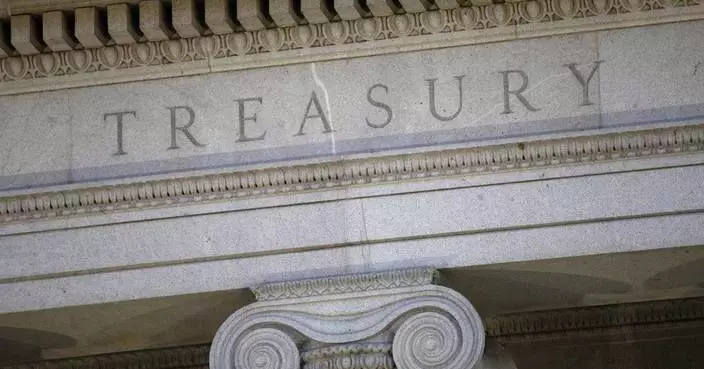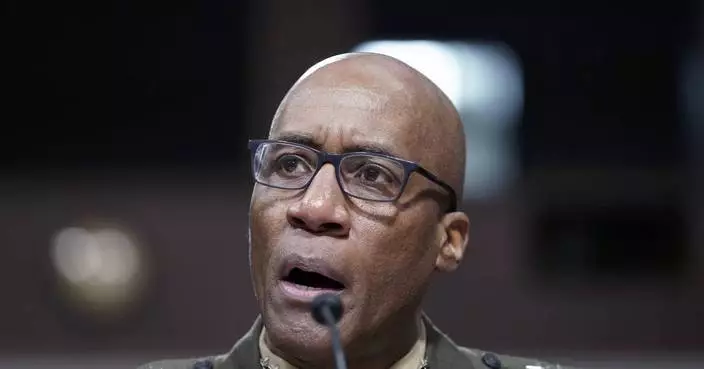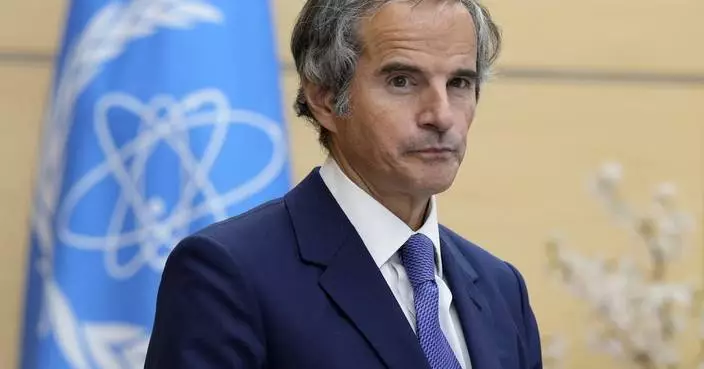The surgeon usually takes responsibility for whatever happens inside the operating room. Should a multilateral organization do the same when one of its member countries does not reach the goals agreed upon as part of a major loan program?
The International Monetary Fund has now failed twice to bring durable reforms to Argentina. Experts say the disappointing result could damage the IMF's reputation.
"They have to worry about their reputation because this is the second time they made a mess of Argentina and everybody knows it in the world," said Mark Weisbrot, co-director of the Center for Economic and Policy Research. "The IMF is going to continue to loose influence in the world. That has been the trend for 20 years now."
President Mauricio Macri's decision to get financing from the IMF brought bad memories to many Argentines, who blame the Fund for the financial crisis in 2001 that left millions of people unemployed and sent the poverty rate above 50%.
That year the South American country entered a historical default for $100 billion and it was able to return to the financial markets 15 years later only after a laborious legal fight with creditors.
Macri last year got a $57 billion loan, the largest in IMF's history, as part of a strict program to cut public spending.
"The problem is the IMF responses are always politically disastrous and make it impossible for any reformer to survive," said Benjamin Gedan, director of the Wilson Center's Argentina Project.
Both experts say a fundamental mistake by the IMF was to push for too-strict cuts even when the Argentine economy entered recession. While the Fund took the unusual step to include expand some social spending for vulnerable groups as part of the program, it failed to gather support among the general population.
The Associated Press asked the IMF whether it takes any responsibility for the 15-point lead that left-leaning Alberto Fernández held over the conservative Macri in last month's presidential primaries, an outcome that made the populist candidate a heavy favorite in the presidential elections set for October 27 and panicked financial markets fearful of a return to the interventionist policies in place under the poll leader's running-mate, former President Cristina Fernández de Kirchner, who preceded Macri in office.
"Our focus has been and remains on helping Argentina. IMF staff remains in close contact with the authorities and the Fund will continue to stand with Argentina during these challenging times," IMF spokesperson Gerry Rice replied.
Economists fear that the 30% depreciation of the peso since the primaries will send the inflation rate over 50% by yearend.
Gedan said the inability to read the political reality in the country places the Fund in an "impossible" situation because "the reformers are almost certainly leaving office and the IMF is being asked to continue to lend, when the next government has shown no commitment on meeting the IMF requirements."
The Fund has yet to make a final disbursement of $5.4 billion, originally planned for this month.
Former IMF leader Christine Lagarde has acknowledged a possible mistake by the IMF in its handling of the most recent Argentine crisis.
"It is an economic situation which it was incredibly complicated," she said at the American Enterprise Institute in June, weeks before stepping down as the Fund's head. "I think many players, ourselves included, underestimated a bit when we started trying to help and put together with the Argentine authorities a program."
Lagarde described the inflation rate as the "most surprising component" because "instead of stabilizing and gradually declining as we had anticipated, it is showing much more resilience than we had thought."
Follow Luis Alonso Lugo on Twitter: http://www.twitter.com/luisalonsolugo
BELGRADE, Serbia (AP) — Serbian lawmakers on Thursday voted into office a new government that reinstated two pro-Russia officials who are sanctioned by the United States, reflecting persistent close ties with Moscow despite the Balkan nation's proclaimed bid to join the European Union.
Prime Minister Miloš Vučević's government got backing in a 152-61 vote in the 250-member parliament. The remaining 37 lawmakers were absent.
The government includes former intelligence chief Aleksandar Vulin, who has made several visits to Russia in recent months, as one of several vice-premiers, along with Nenad Popović, another Russia supporter who has faced U.S. sanctions.
The foreign minister in the previous government, Ivica Dačić, also a pro-Russia politician, will be in charge of the Interior Ministry in the new Cabinet.
The vote followed a heated two-day debate. President Aleksandar Vučić's ruling nationalist conservative Serbian Progressive Party holds a comfortable majority after an election in December that fueled political tensions because of reports of widespread irregularities.
The increasingly authoritarian Vučić has refused to join Western sanctions against Moscow over its full-scale invasion of Ukraine, though Serbia has condemned the aggression.
Vučević, the new prime minister, reiterated that Belgrade doesn't intend to impose sanctions on Russia and “cannot and will not give up" the friendship with Russia. Integration into the EU remains a ”strategic goal," Vucevic said.
"Best possible” relations with the U.S. also are in Serbia's interest, Vučević added. “I firmly believe that our relations can once again be on a high level.”
Security analyst and a Belgrade university professor Filip Ejdus described the new government's composition as a “spin" designed to send a message both to the West and Russia, and to voters at home.
“It sends a message to the EU that they should not push Belgrade too much over democracy, rule of law, or Kosovo if they want to keep Serbia in its orbit,” Ejdus said. “At the same time, it signals to Moscow a readiness to strengthen the strategic partnership with Russia.”
The U.S. imposed sanctions on Vulin in July, accusing him of involvement in illegal arms shipments, drug trafficking and misuse of public office.
The U.S. Treasury Department’s Office of Foreign Assets Control said that Vulin used his public authority to help a U.S.-sanctioned Serbian arms dealer move illegal arms shipments across Serbia’s borders. Vulin is also accused of involvement in a drug trafficking ring, according to U.S. authorities.
Vulin, who in the past had served as both the army and police chief, has recently received two medals of honor from Russia, one from the Federal Security Service, or FSB, and the other was awarded to him by Russian President Vladimir Putin.
Popović, a businessman and a former government minister, has “used his Russia-based businesses to enrich himself and gain close connections with Kremlin senior leaders,” the U.S. Treasury said last November in a statement.
The U.S. sanctions against individuals and companies in the Balkans are designed to counter attempts to undermine peace and stability in the volatile region and Russia's “malign” influence.
The West has stepped up efforts to lure the troubled region into its fold, fearing that Russia could stir unrest to avert attention from the war in Ukraine. The Balkans went through multiple wars in the 1990s, and tensions still persist.
Serbia's falling democracy record has pushed the country away from EU integration, explained Ejdus. Reports of election fraud at the Dec. 17 vote triggered street protests and clashes.
“Vučić is still pretending to be on the EU path because it’s beneficial for Serbia’s economy, and the EU tolerates his authoritarian tendencies out of fear of instability that could be caused in its backyard if Belgrade was lost to Russia and China,” Ejdus said.
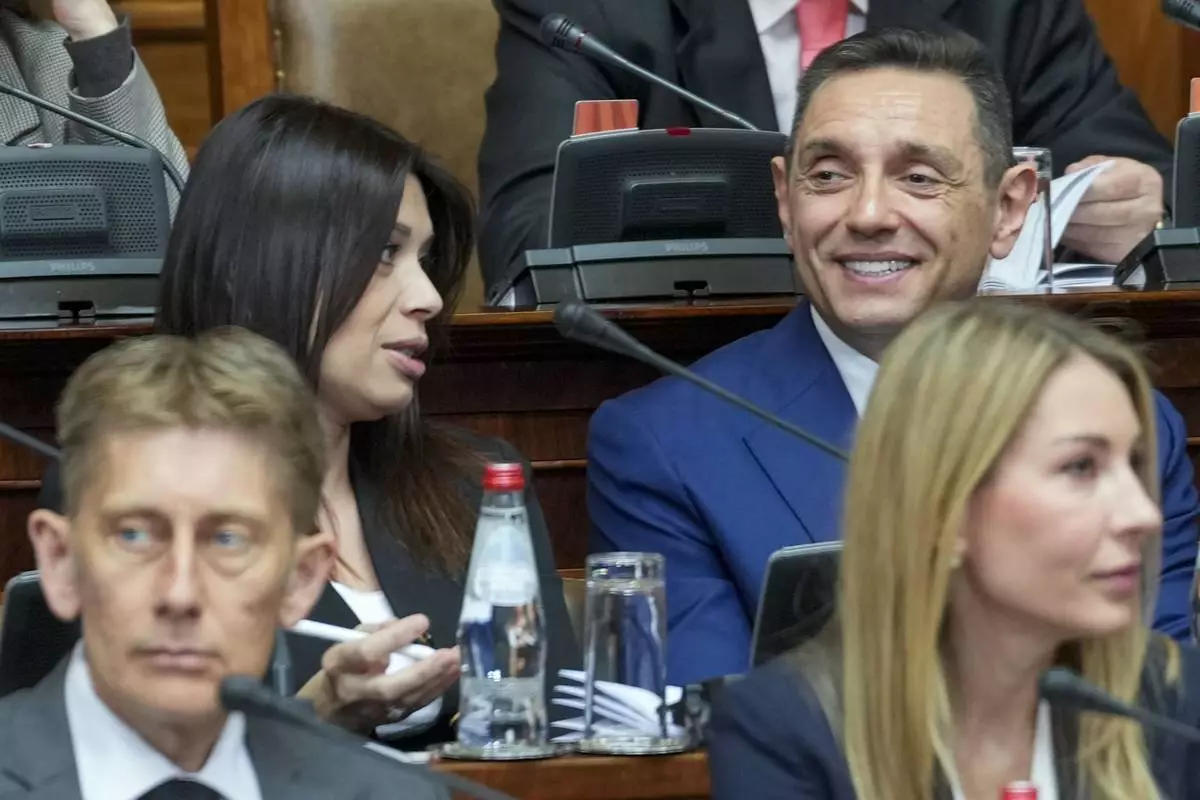
Aleksandar Vulin, former director of Serbia's intelligence agency, right, smiles during a parliament session while Serbia's prime minister designate Milos Vucevic presents a plan for the new government to the parliament members in Belgrade, Serbia, Wednesday, May 1, 2024. Serbia's new government will include a former intelligence chief, Aleksandar Vulin who has fostered close ties with Russia and is sanctioned by the United States. (AP Photo/Darko Vojinovic)

Serbia's Prime Minister designate Milos Vucevic presents a plan for the new government to the parliament members in Belgrade, Serbia, Wednesday, May 1, 2024. (AP Photo/Darko Vojinovic)
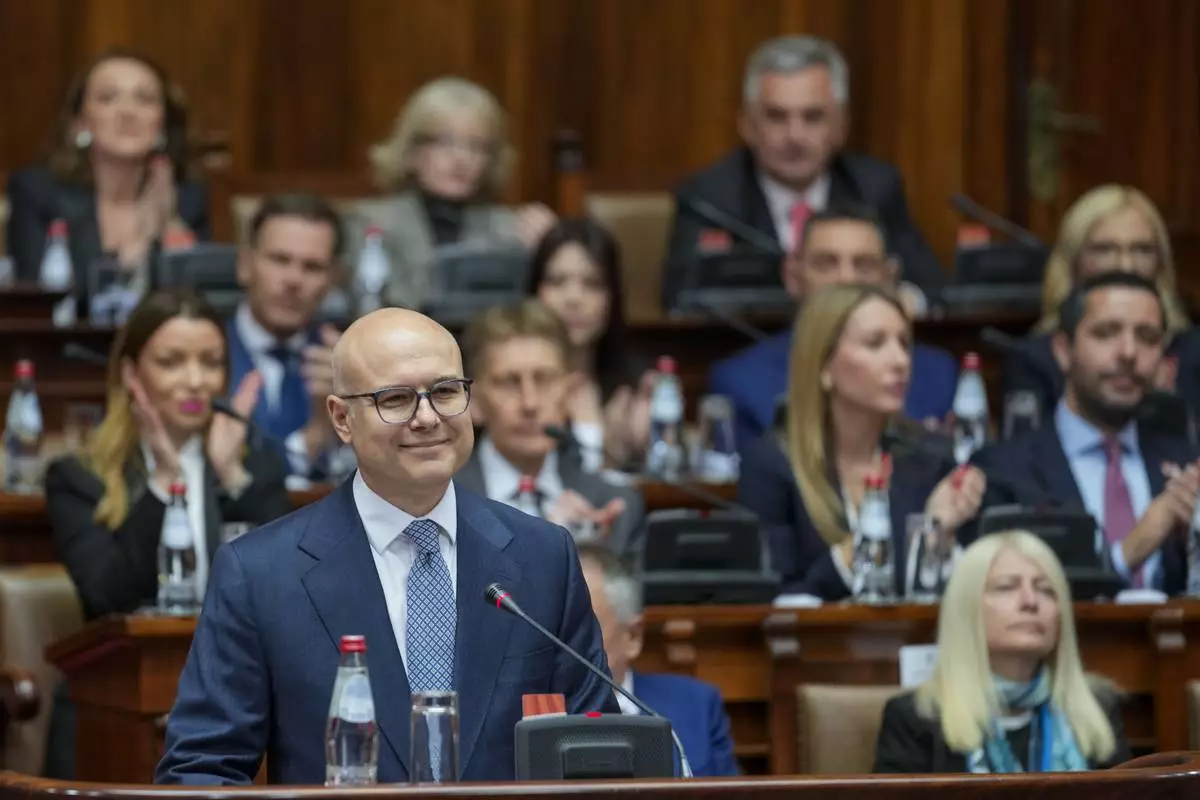
Serbia's Prime Minister designate Milos Vucevic presents a plan for the new government to the parliament members in Belgrade, Serbia, Wednesday, May 1, 2024. (AP Photo/Darko Vojinovic)

Serbia's former Prime Minister and Parliament speaker Ana Brnabic, left, speaks with Serbia's new Prime Minister Milos Vucevic at the parliament session during her cabinet's swearing in ceremony at the Serbian Parliament building in Belgrade, Serbia, Thursday, May 2, 2024. Serbian lawmakers on Thursday voted into office a new government that reinstated two pro-Russia officials who are sanctioned by the United States, reflecting persistent close ties with Moscow despite the Balkan nation's proclaimed bid to join the European Union. (AP Photo/Darko Vojinovic)
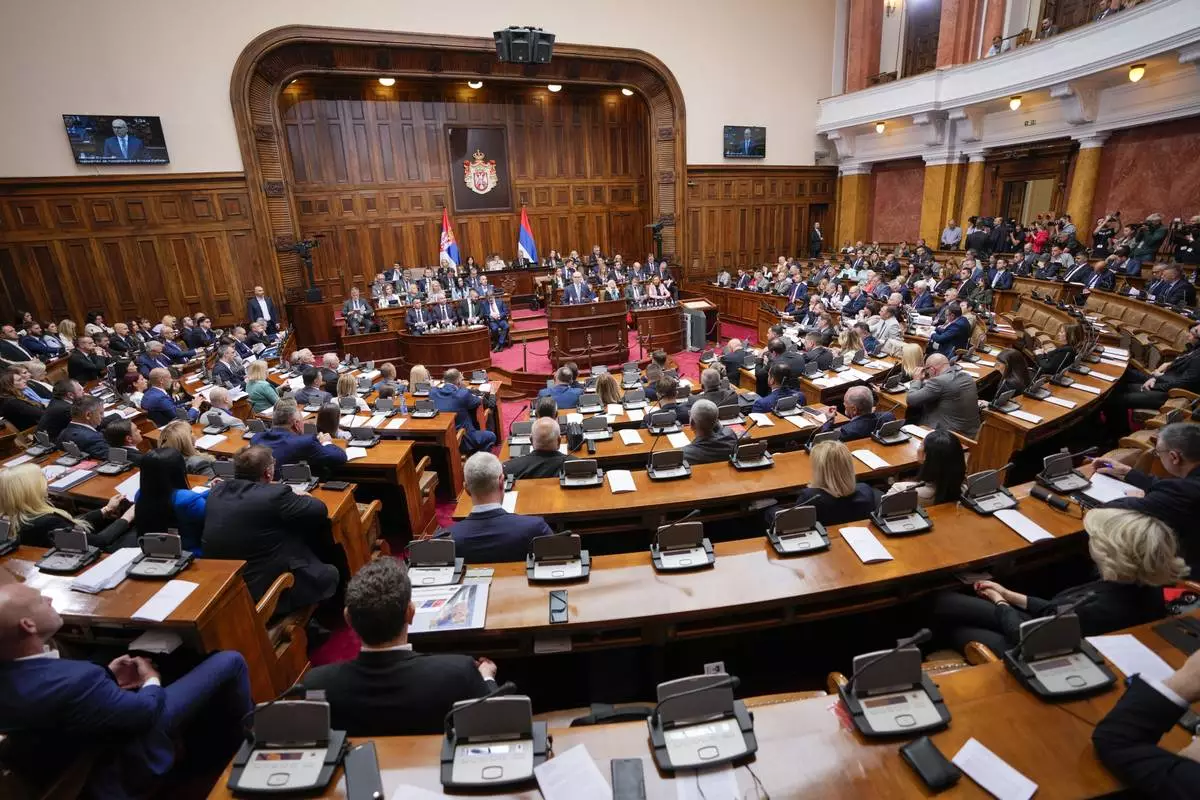
Serbia's Prime Minister designate Milos Vucevic presents a plan for the new government to the parliament members in Belgrade, Serbia, Wednesday, May 1, 2024. (AP Photo/Darko Vojinovic)
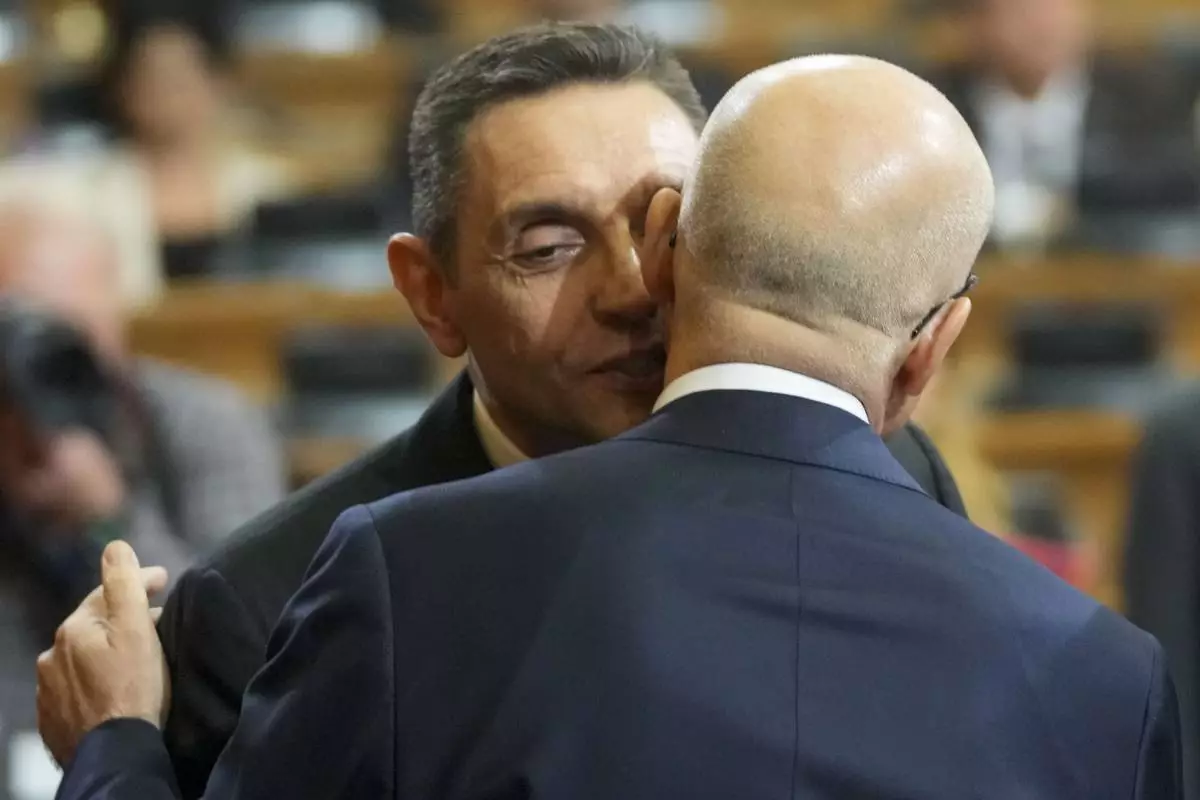
Serbia's new Prime Minister Milos Vucevic, front, speaks with Aleksandar Vulin, former director of Serbia's intelligence agency, who has fostered close ties with Russia and is sanctioned by the United States at the parliament session during the cabinet's swearing in ceremony at the Serbian Parliament building in Belgrade, Serbia, Thursday, May 2, 2024. Serbian lawmakers on Thursday voted into office a new government that reinstated two pro-Russia officials who are sanctioned by the United States, reflecting persistent close ties with Moscow despite the Balkan nation's proclaimed bid to join the European Union. (AP Photo/Darko Vojinovic)
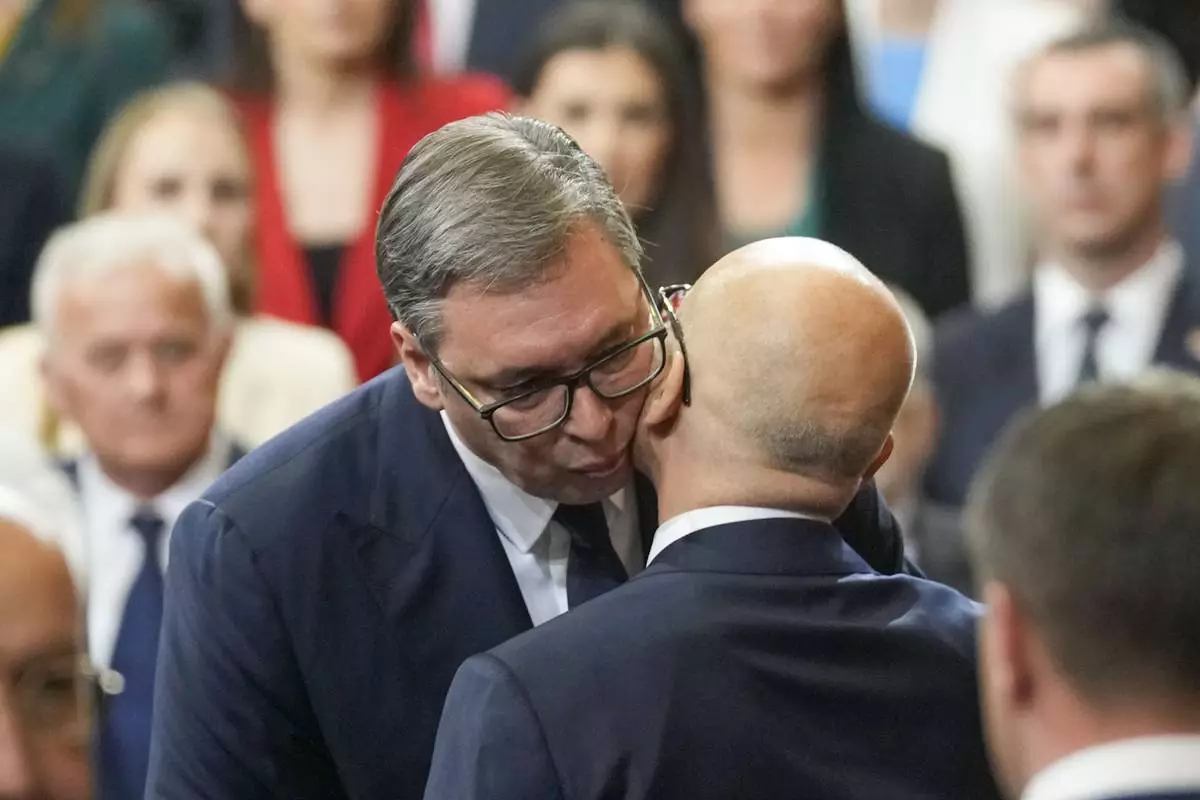
Serbian President Aleksandar Vucic, left, kisses Serbia's new Prime Minister Milos Vucevic after taking the oath during the cabinet's swearing in ceremony at the Serbian Parliament building in Belgrade, Serbia, Thursday, May 2, 2024. Serbian lawmakers on Thursday voted into office a new government that reinstated two pro-Russia officials who are sanctioned by the United States, reflecting persistent close ties with Moscow despite the Balkan nation's proclaimed bid to join the European Union. (AP Photo/Darko Vojinovic)
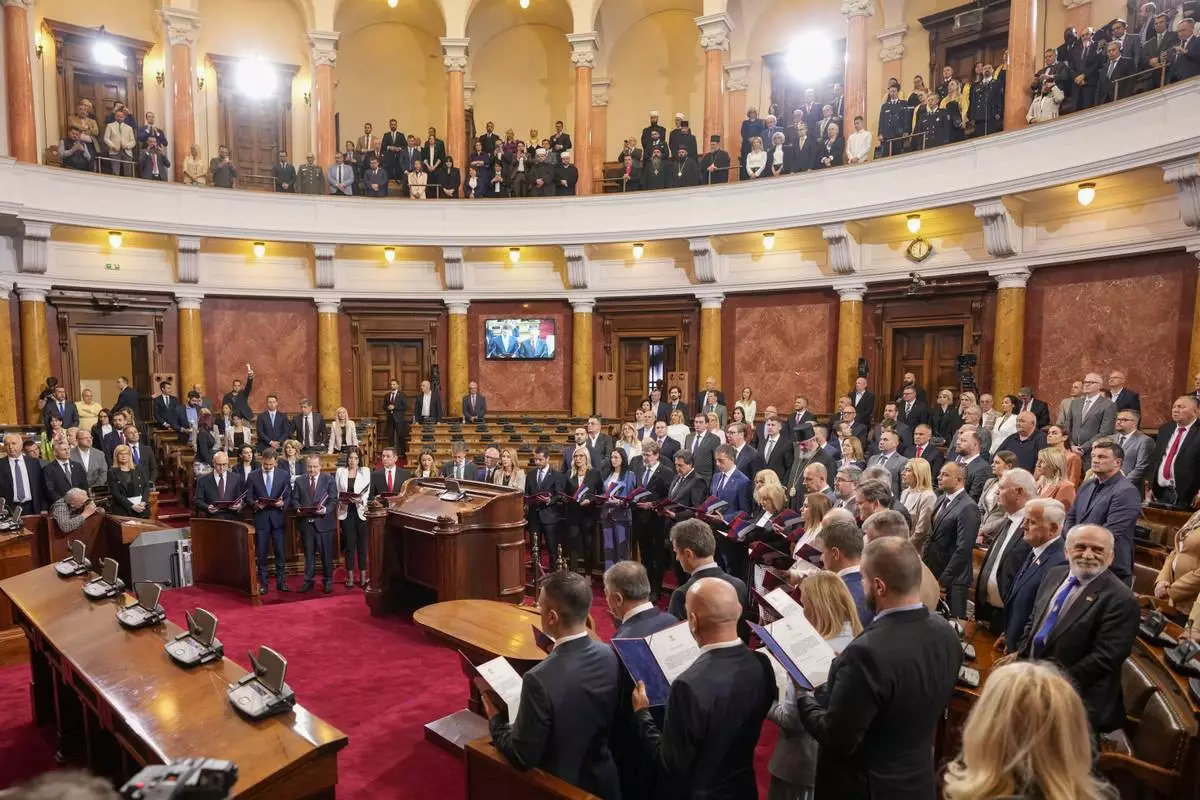
Serbia's new Prime Minister Milos Vucevic and ministers of the new government of Serbia read their oaths at the parliament session during her cabinet's swearing in ceremony at the Serbian Parliament building in Belgrade, Serbia, Thursday, May 2, 2024. Serbian lawmakers on Thursday voted into office a new government that reinstated two pro-Russia officials who are sanctioned by the United States, reflecting persistent close ties with Moscow despite the Balkan nation's proclaimed bid to join the European Union. (AP Photo/Darko Vojinovic)













